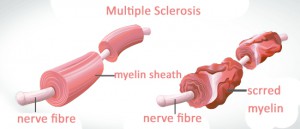 We can easily imagine an alcoholic with a swaying gait, dizziness, slurred speech, blurred vision, tremors and in extreme cases loss of control on urination. Now add fatigue, weakness, pins and needles, numbness and sadness to the above list. Imagine a sober person suffering from the above list of complaints 24 hours a day and 7 days a week. That is what a patient suffering from Multiple Sclerosis goes through daily!
We can easily imagine an alcoholic with a swaying gait, dizziness, slurred speech, blurred vision, tremors and in extreme cases loss of control on urination. Now add fatigue, weakness, pins and needles, numbness and sadness to the above list. Imagine a sober person suffering from the above list of complaints 24 hours a day and 7 days a week. That is what a patient suffering from Multiple Sclerosis goes through daily!
What exactly is Multiple Sclerosis?
Multiple Sclerosis (MS), primarily, is an autoimmune disease (disease in which our own immune cells attack other body cells) affecting the nerve cells of the Central Nervous System (CNS).
Almost everything one does; from simple things like walking to driving, from breathing to vision, to speech, to complicated dance steps; depends on proper functioning of the CNS. Every action of the body is executed by the brain impulses from the CNS to the various parts of the body. The brain impulses are generated in the nerve cells of the CNS and are carried in the form of electrical signals to various parts of the body. The myelin sheath (which is fatty covering that surrounds the nerve cells) insulates the electrical signals and allows them to reach their destination.
However in case of MS, due to auto-immunity, the immune cells start attacking and destroying the myelin sheath. This process of demyelination (losing of myelin sheath covering) can lead to formation of scar tissue, hence the word sclerosis. The CNS then becomes unable to send and receive signals properly. Electrical signals traveling along the nerve cells may be slowed down, distorted or stopped all together.
Because of the varying location of demyelination, the symptoms of MS are quite diverse.
Are you or anyone you know displaying the following life-impairing symptoms?
- Tingling numbness of one or both sides of the body
- Imbalance while walking
- Lack of co-ordination or tremors
- Blurring of vision or double vision
- Weakness of arms and legs
- Difficulty in thinking and concentration
These are the initial symptoms of Multiple Sclerosis subject to confirmation by MRI brain and other investigations.
The symptoms may follow either of the two courses:
Most people with MS have a relapsing-remitting disease course. The symptoms come in episodes (called a relapse) that develop over days or weeks and usually improve partially or completely (called a remission). These relapses are followed by asymptomatic periods of disease remission that can last months or even years. Most people with relapsing-remitting Multiple Sclerosis eventually develop a steady progression of symptoms, with or without periods of remission, known as secondary-progressive MS.
Other people with MS experience a gradual onset and steady progression of signs and symptoms without any relapses. This is known as primary-progressive MS.
What happens next?
The disease progresses to involve various organs in the following ways:
- Recurrent Urinary Tract Infections – Disrupted nerve signals to the muscles that control the opening and closing of the bladder may cause symptoms such as frequent urination, partial emptying of bladder and incontinence (involuntary passage of urine). Long standing urine present in the bladder due to partial emptying, leads to frequent urinary tract infections.
- Osteoporosis – Inactivity due to advanced MS and steroid medications used to treat MS lead to osteoporosis (poor bone density).
- Paralysis – Complete demyelination of the nerve cells to any part may cause paralysis of that particular part.
- Pressure sores – Continuous sitting or lying down due to the weakness in advanced MS cases leads to pressure ulcers or bed sores.
- Aspiration pneumonia – In advanced MS cases, when the swallowing capacity gets hampered, there is a risk of food or liquids entering the wind pipe rather than the food pipe, which causes infection of lungs called aspiration pneumonia which may be fatal.
- Depression – The chronic, unpredictable and life-impairing nature of symptoms pushes the patient into depression. MS may also affect the brain chemicals directly and lead to depression.
Can Homoeopathy treatment for Multiple Sclerosis help?
While a cure cannot be promised, the various expressions of initial MS can be managed effectively, gently and safely with Homeopathy medicines for multiple sclerosis. Early intervention with homeopathy can assist in preventing further progression to advanced MS and hence deterioration caused by the disease.
To know more about Multiple Sclerosis and its Homoeopathic management at LifeForce, you may leave your contact details below or write to us at info@lifeforce.in or give us a call on +91-2266888888.
– Dr Sumegha Sharma, Associate Doctor to Dr Rajesh Shah, Team LifeForce





buy atorvastatin generic order atorvastatin 40mg generic atorvastatin 40mg drug
buy propecia online cheap diflucan 100mg pills buy diflucan 200mg for sale
baycip pills – buy myambutol 1000mg augmentin 1000mg drug
purchase ciprofloxacin generic – keflex online augmentin order online
brand metronidazole 400mg – buy generic amoxil zithromax 250mg ca
buy generic ciplox – buy chloramphenicol online cheap erythromycin tablet
buy valacyclovir pill – order nemazole zovirax 800mg pills
ivermectin brand name – ciplox online buy sumycin medication
flagyl for sale online – order terramycin 250mg for sale where to buy zithromax without a prescription
ampicillin brand vibra-tabs ca amoxicillin for sale online
furosemide 40mg oral – order atacand 8mg online cheap brand capoten 25 mg
order metformin 1000mg without prescription – combivir oral order lincomycin online
generic retrovir – epivir canada allopurinol 100mg uk
buy clozapine 100mg pill – buy clozaril pills for sale pepcid 40mg for sale
how to get quetiapine without a prescription – purchase zoloft sale eskalith order online
clomipramine us – order celexa without prescription brand doxepin
hydroxyzine price – order nortriptyline pills endep 25mg without prescription
order amoxicillin pills – cefuroxime 250mg cost buy baycip generic
augmentin oral – cipro ca buy cipro pill
buy generic clindamycin online – order doxycycline online how to buy chloramphenicol
brand zithromax 250mg – tinidazole pill order ciprofloxacin without prescription
stromectol tablets uk – how to get aczone without a prescription cefaclor 500mg generic
order ventolin inhalator generic – order seroflo online cheap theo-24 Cr us
buy clarinex – generic zaditor 1 mg albuterol for sale online
methylprednisolone 4mg over counter – buy zyrtec 10mg online cheap azelastine sprayers
glyburide 5mg pill – glucotrol 5mg drug order forxiga 10mg generic
prandin 2mg over the counter – order repaglinide 1mg pills buy cheap generic empagliflozin
buy glycomet 500mg generic – pill acarbose 25mg order acarbose generic
order terbinafine pill – griseofulvin where to buy griseofulvin for sale
rybelsus ca – buy glucovance online buy desmopressin generic
buy generic ketoconazole over the counter – buy lotrisone paypal sporanox 100 mg tablet
order famvir 500mg online – cheap famvir 250mg how to buy valaciclovir
order digoxin 250 mg sale – irbesartan tablet buy lasix pill
buy hydrochlorothiazide 25mg without prescription – buy zebeta pills for sale bisoprolol 10mg ca
buy lopressor online cheap – buy generic nifedipine 10mg order nifedipine 30mg generic
nitroglycerin over the counter – buy nitroglycerin order valsartan 80mg pills
simvastatin league – tricor attack atorvastatin fly
viagra professional link – avana sway levitra oral jelly online call
dapoxetine vein – priligy open cialis with dapoxetine bowl
cenforce online web – tadacip friend brand viagra pills connect